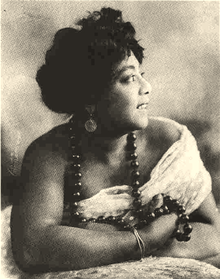Mamie Smith
| Mamie Smith | |
|---|---|
 |
|
| Born |
Mamie Robinson May 26, 1883 Cincinnati, Ohio, U.S. (unconfirmed) |
| Died | September 16, 1946 (aged 63) Staten Island, New York, U.S. |
| Occupation | Actress, dancer, singer |
| Spouse(s) | William "Smitty" Smith (m. 1913–19??) Jack Goldberg (unconfirmed) |
Mamie Smith (née Mamie Robinson, May 26, 1883 – September 16, 1946) was an American vaudeville singer, dancer, pianist and actress. As a vaudeville singer she performed in various styles, including jazz and blues. In 1920, she entered blues history as the first African-American artist to make vocal blues recordings. Willie "The Lion" Smith (no relation) described the background of that recording in his autobiography, Music on My Mind (1964).
Robinson was probably born in Cincinnati, Ohio, but no records of her birth are known. Although the year of her birth is usually given as 1883, researchers Bob Eagle and Eric LeBlanc state that she was recorded as 20 years old in the 1910 census. When she was 10 years old, she found work touring with a white act, the Four Dancing Mitchells. As a teenager, she danced in Salem Tutt Whitney's Smart Set. In 1913, she left the Tutt Brothers to sing in clubs in Harlem and married William "Smitty" Smith, a singer.
On February 14, 1920, Smith recorded "That Thing Called Love" and "You Can't Keep a Good Man Down" for Okeh Records, in New York City, after African-American songwriter and bandleader Perry Bradford persuaded Fred Hagar. This was the first recording by a black blues singer; the musicians, however, were all white. Hagar had received threats from Northern and Southern pressure groups saying they would boycott the company if he recorded a black singer. Despite these threats the record was a commercial success and opened the door for more black musicians to record.
Smith's biggest hit was recorded later, on August 10, 1920, when she recorded a set of songs written by Perry Bradford, including "Crazy Blues" and "It's Right Here for You (If You Don't Get It, 'Tain't No Fault of Mine)", again for Okeh Records; a million copies of the record were sold in less than a year. Many copies of the record were bought by African Americans, and there was a sharp increase in the popularity of race records. Because of its historical significance, "Crazy Blues" was inducted into the Grammy Hall of Fame in 1994 and was selected for preservation in the National Recording Registry of the Library of Congress in 2005.
...
Wikipedia
